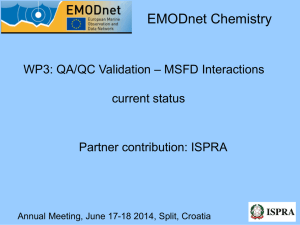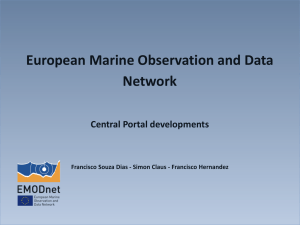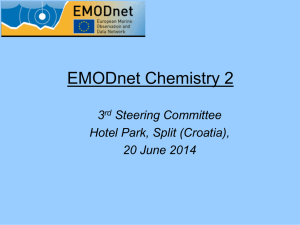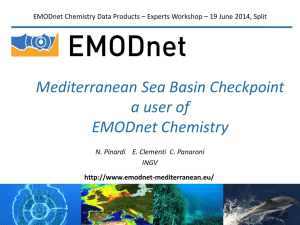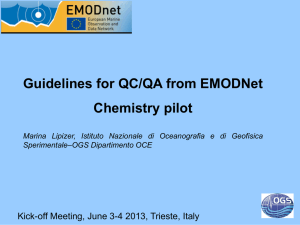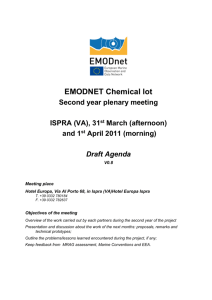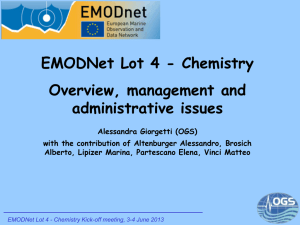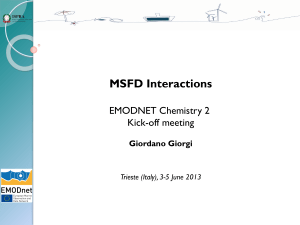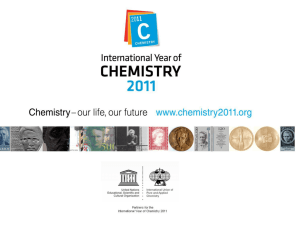TG_Data_MSFD_Impl_Expert_Workshop_19_June_2014
advertisement
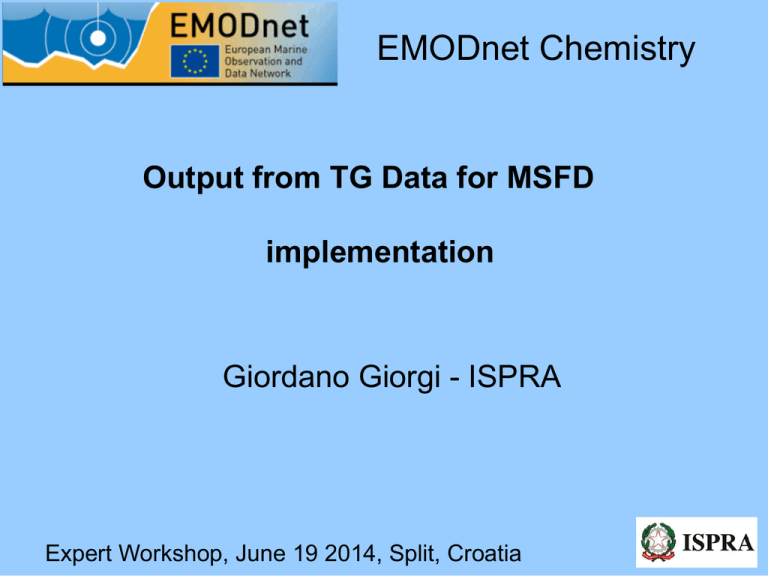
EMODnet Chemistry Output from TG Data for MSFD implementation Giordano Giorgi - ISPRA Expert Workshop, June 19 2014, Split, Croatia EMODnet Chemistry MSFD implementation: status of art • MS have produced Report on initial assessment, determination of Good Environmental Status (GES) and identification of Environmental Targets in fall 2012 – spring 2013 • MS have to define and implement MSFD monitoring programmes on 15th July and communicate them to EC on 15th October 2014 • MS have to establish MSFD programmes of measures to reach GES by 2015 • MS will be requested to take position on how monitoring data present and future will be made available to EC and EEA. Expert Workshop, June 19 2014, Split, Croatia EMODnet Chemistry New initiatives of European Commission on Common Implementation Strategy of Marine Strategy Framework Directive: • Newly established Technical Group on Data (TG Data) to support Working Group DIKE for handling, sharing and streamlining MSFD monitoring data also with other reporting requirements; • EC has started recently a MED-CIS programme to foster MSFD implementation for EU Mediterranean MS with the involvement of Barcelona Convention (UNEP/MAP) also in relation with EcAP (Ecological Approach) Process on UNEP/MAP Monitoring Expert Workshop, June 19 2014, Split, Croatia EMODnet Chemistry TG Data is chaired by EEA and is relevant for EMODNet Chemistry for Descriptor 5 for Eutrophication and Descriptor 8 on Contaminants: • Accessing data and information according to MSFD Art. 19.3, in the context of WISE-Marine and associated to INSPIRE, EMODnet, and other relevant processes and projects; • Geographic handling and visualization of reported information; • Technical development of WISE-Marine, including linkages to other reporting requirements (e.g. for Regional Sea Conventions, Water Framework Directive and the Nature Directives), and preparation of dissemination products, including mapped information; • Technical development of decentralised reporting methods and systems. Expert Workshop, June 19 2014, Split, Croatia EMODnet Chemistry 1st Meeting of TG Data on 29-30 April 2014 on Eutrophication and Contaminants (1): • Review of data flows on chemical monitoring parameter on nutrients and contaminants provided by MS with EIONET, RSCs, WFD and so on, according to different D5 and D8 indicators • EMODNet candidate platform for testing and implementation of D5 and D8 indicators at regional and subregional scale. Consequence: very important to distinguish data relevant for MSFD implementation in EMODNet Chemistry Expert Workshop, June 19 2014, Split, Croatia EMODnet Chemistry 1st Meeting of TG Data on 29-30 April 2014 on Eutrophication and Contaminants (2): • Info on QA/QC in EMODNet Chemistry in relation to Commission Directive 2009/90/EC on technical specifications for chemical analysis and monitoring of water status,sediment and biota (ISO 17025:2005) (Work Package 3) • DIVA interpolation map very useful for MSFD applications: data need to be “spatialized” in order to be compared with other environmental information layers. But such approach needs to be discussed in depth in order to be “adopted”. Biogeochemical models should also be involved? Could be DIVA integrated with them? And if yes, How? Expert Workshop, June 19 2014, Split, Croatia EMODnet Chemistry General setting for QA/QC validation for WP3: ● Some QCs are currently being performed ex-post by Regional data collector in order to produce aggregation and DIVA interpolation maps ● Spikes, outlier ● Lack of data on geographic coordinates, depth, etc.. ● Missing values or values below limit of detection WP3 approach mainly on QC and also QA performed ex-ante by data provider Expert Workshop, June 19 2014, Split, Croatia EMODnet Chemistry Draft proposal of a Questionnaire based on ISO/IEC 17025:2005 (1): ● ● General questions of laboratory QA/QC according to 17025:2005 (qualified personnel, equipment calibration, use of standard or published methods, accuracy, precision, limit of detection and quantification General questions to all matrices (code lists of vocabularies, CAS Number, Cruise ID’s/ Geographic area/ Organisation/Research, Station Names- coordinates, Sampling method and storage, Analytical method, Limit of detection/limit of determination, Uncertainty, Units (preferred EMODNet Chemistry), Reference Materials-intercalibration Expert Workshop, June 19 2014, Split, Croatia EMODnet Chemistry Draft proposal of a Questionnaire based on ISO/IEC 17025:2005 (2): Questions specific for matrices ● ● Seawater ● Sample type with indication of total, dissolved or particulate fraction ● Method of Filtration Biota ● ● Species (species must match to the European Register of Marine Species (ERMS) or ITIS (Taxonomic Information System), maximum range for age, length and weight of species ● Number of Individuals in biota samples ● Tissue Sediment ● Grain size of the fractionated sample Expert Workshop, June 19 2014, Split, Croatia EMODnet Chemistry TG Data, INSPIRE and relation with Regional Sea Conventions INSPIRE • INSPIRE compliance of EMODNet Chemistry portal • Can MS use EMODNet Chemistry in order to be compliant with INSPIRE for Nutrients and Contaminants data? For Barcelona Convention on Mediterranean Sea: • EC MED-CIS programme to foster MSFD implementation for EU Mediterranean MS with involvement of Barcelona Convention UNEP/MAP Info-RAC for Data Management and Collection has never really started • EMODNet Chemistry could also be a candidate platform for UNEP/MAP? Expert Workshop, June 19 2014, Split, Croatia
